Retro Replay Review
Gameplay
Secret Agent delivers a straightforward yet addictive loop that centers on quick reflexes and split-second decision-making. Players control a nameless operative who must catch valuable items—U.S. documents, money cases, and money bags—as they fall from above. At first, the pace is forgiving, giving newcomers time to learn where objects land, but the tension ramps up quickly as the descent speed increases and the spawn patterns become less predictable.
(HEY YOU!! We hope you enjoy! We try not to run ads. So basically, this is a very expensive hobby running this site. Please consider joining us for updates, forums, and more. Network w/ us to make some cash or friends while retro gaming, and you can win some free retro games for posting. Okay, carry on 👍)
The hallmark of the experience is the “hand off” mechanic: after a set time, a tone alerts you that the boats below have paused, offering a narrow window to position yourself above them for a successful transfer. It’s a simple twist that injects strategy into what might otherwise be a mere test of speed, forcing you to juggle high-priority items with the looming threat of missing the boat entirely.
Hazards such as bugs, grenades, and guns appear intermittently to throw you off balance. Mistaking a grenade for a money bag can be disastrous, depleting your score or even ending your run prematurely. Learning to distinguish safe items from dangerous ones at a glance adds a layer of depth that keeps every session engaging, as you balance risk and reward in real time.
For those who prefer shared thrills, the two-player mode alternates turns, turning each drop and dodge into an opportunity to outshine your opponent. The competitive element may feel light—since players don’t interact directly—but it fosters a lively atmosphere of “just one more round” that’s perfect for friends or family gatherings.
Graphics
Graphically, Secret Agent embraces a clean, sprite-based aesthetic that harks back to the golden age of arcade titles. The backgrounds are minimalistic—plain skies give way to a gentle horizon, and the boats below are rendered with simple yet recognizable shapes. This uncluttered design keeps the focus squarely on the falling items and hazards.
Items and threats are color-coded for instant recognition: green for money bags, brown for document cases, red for grenades, and so on. This palette-driven clarity is essential when dozens of objects rain down at breakneck speed. While not pushing modern hardware, the bright visuals and smooth animations ensure there’s never any confusion about what you’re catching or avoiding.
Subtle details—like the bobbing motion of each boat and the brief dust clouds when items hit the deck—add a surprising amount of character. These small flourishes give the stage a sense of life despite its simplicity, reminding you that every catch or near-miss is happening in a world, however stylized, that feels coherent.
Particle effects for explosions and document fluttering lend just enough flair without overwhelming the screen. There are no flashy shaders or dynamic lighting here; instead, Secret Agent succeeds on elegant minimalism, delivering visuals that serve gameplay first and foremost.
Story
At its heart, Secret Agent leans heavily on the iconic hook from Johnny Rivers’ “Secret Agent Man”: “They’ve given you a number and taken away your name.” It’s a fitting mantra for a game in which your identity is subsumed by mission objectives. You are “Agent 007-whatever,” dispatched solely to secure precious intelligence and financial assets.
There’s no elaborate cutscene or dialogue tree to explain why these items matter—no dramatics about rogue states or double-crossing bosses. Instead, the narrative emerges organically through the objects you catch and the urgency with which you must hand them off. The minimal story allows you to project your own spy fantasies onto the action, turning each successful transfer into a personal victory against an unseen enemy.
Despite the lack of a traditional plot, the atmosphere is rich. The constant hum of tension—signaled by that all-important tone—evokes clandestine exchanges on moonlit harbors. Every time you dive for a falling money case, you’re reminded that this is high-stakes work, and failure isn’t just a lost point but a compromise of national secrets.
This stripped-down narrative approach may not satisfy players craving intricate lore, but it’s entirely appropriate for a fast-paced arcade experience. The story here exists in the mechanical heartbeat of the gameplay, fusing theme and action into a cohesive, if spare, covert-ops scenario.
Overall Experience
Secret Agent stands out as a deceptively simple game that manages to stay engaging through its clever blending of reflex-driven challenges and strategic timing. Each run feels unique, thanks to variable drop patterns and the pulse-raising “boat stop” alert, which keeps you on edge until the very last item is collected.
The game’s accessible controls and clear visual language make it suitable for players of all skill levels, from younger audiences just learning hand–eye coordination to seasoned arcade enthusiasts chasing perfection. The alternating two-player mode spices up social play, offering enough friendly rivalry to keep everyone invested without overstaying its welcome.
While its graphics and narrative are intentionally minimalist, these choices reinforce the core loop rather than detract from it. If you’re looking for a sprawling story or cutting-edge visuals, you won’t find them here. Instead, Secret Agent excels at delivering pure, focused gameplay that rewards quick thinking and nimble reflexes.
For anyone in search of a bite-sized retro-inspired challenge—whether as a solo pursuit or a party-time diversion—Secret Agent proves itself a worthy mission. It may bear the name “Agent,” but it’s you who emerges as the real secret weapon.
 Retro Replay Retro Replay gaming reviews, news, emulation, geek stuff and more!
Retro Replay Retro Replay gaming reviews, news, emulation, geek stuff and more!
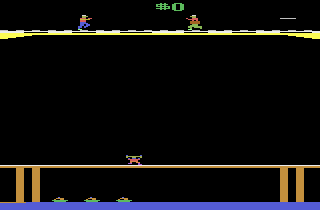
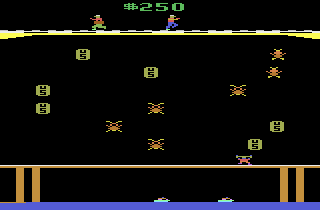
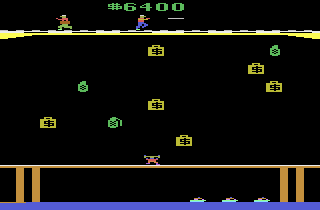
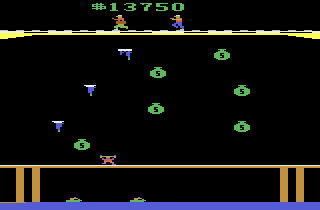
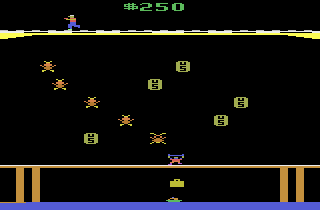



Reviews
There are no reviews yet.